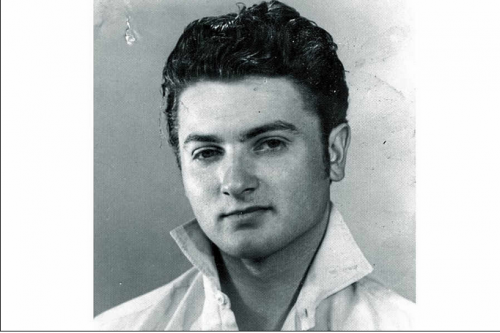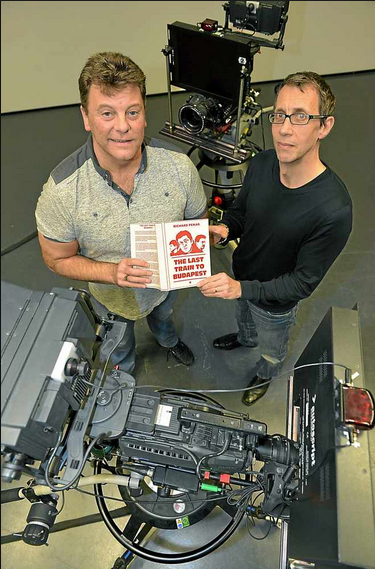29th April 2014 Budapest, Hungary
The Last Train to Budapest: a movie about Britain and Hungary in 1956
In two years’ time we are celebrating the 60th anniversary of the 1956 revolution. It is going to be an excellent occasion to tell yet untold tales about the historical moments, the fights, the tragedies, but above all: the people. Not much has been told about the revolutionaries who had fought for the freedom of Hungary all over the country, and when their cause was defeated, escaped and found a new home in Britain. My father was one of them. I wrote a book about his fascinating story which now we are turning into a movie entitled The Last Train to Budapest. With your help, we plan to show it as part of the 2016 celebrations.

My father Nándor Pekár was a true Hungarian patriot and was brought up realising the best Hungarian values. His attitude to life, coupled with an outstanding tale of amazing bravery, and aided by a fundamental unique spirit inspired me to record his story into the written word.
The Last Train to Budapest draws a picture of the communist years leading to the 1956 Hungarian Revolution, and at the same time conjures a family-like empathy that gently persuades the reader to become a part of the story as if they were there themselves. It was the only way I felt to be able to create a true understanding of Hungarian nature. The people of Hungary are a breed like no other and The Last Train to Budapest advertises this through my dad’s childhood, his teenage years, his participation in the revolution, his escape in treacherous conditions and his utmost respect he had for Great Britain.
ITV news report on the short film “The Last Train to Budapest”, from 4 June 2010
As Hungarians in general possess a self-disciplined quality, the story shows how an upbringing in obscure times trains a soul and a mind to know how to live right. I wrote in my book that when the moment of impact arrived in 1956, the people of Hungary let all this passion burst out and showed Russia and the world that they were a well-organised fearless populace and reacted with amazing bravery.
Settling in Stoke-on-Trent, England, in 1957 couldn’t have been easy – but amid the carnage, and the depression of leaving his home and family, my father accepted England as England accepted him. Maybe it was due to his personality, or maybe because English people warm to the underdog story or get excited by stories of freedom-fighting, but whatever the reason, the people of England loved my dad and in return, he loved them back.

Photo: http://www.expressandstar.com/
The extraordinary difference in my story and how the feature film will present it is that many, if not all films related to the Hungarian revolution are mainly showing the Budapest battles. Not all the fighting took place in Budapest, though: people fought in other parts of the country – and what impact did those battles have? But more importantly I guess, what did the people who fought in them or organised them, what did they hope to achieve?
In addition, and the most important for all nations outside of Hungary is the explicitly explained build-up. This film will begin in 1940 so by the time 1956 arrives, the audience will have a clear understanding of what it is like to be a national prisoner and will personally feel the membrane of tension that surrounded a country and most importantly, like a large boil, the audience will too feel the same exact need to lance it.
There are times when it is right to look back on history and to be able to relate to the people of that time in order to understand and to prevent atrocities from happening again. The Last Train to Budapest shows that one nation should never occupy another – history lessons prove that. My book proves it, and the feature film to be is going to show it, too.

Photo: http://www.expressandstar.com/
When my book The Last Train to Budapest became available on an online bookstore a couple of years back, a group of local university students seized a copy of it and read it with an intriguing interest. They approached me with a proposition to make a short film of it, something like a visual synopsis.
Together with the local community and The Hungarian Community Association of Staffordshire, with the students directing and filming, the first film adaptation was born. Since 2010 it has been screened all around the UK and last year at the Toldi Cinema in Budapest. It was then that the UK film company Grand Independent got to hear about a fantastic story that united the qualities of movies like Schindler’s List, Rambo, James Bond, coupled with humour and romance just like in the Crocodile Dundee story.
They read it, scrutinised it and now plan to do the real thing, a full length feature film in English that intends to give to the world the true meaning of Hungary: The Last Train to Budapest.
We need sponsors to get started. If you would like to know more about the project or would like to read the script, please visit https://www.indiegogo.com/projects/the-last-train-to-budapest#home. Your contributions small and large will all help bringing this story to the screen and to a global audience.
The views and opinions expressed in this article are those of the authors and do not necessarily reflect the official policy or position of the British government.
Thank you for helping bring wider attention to this fascinating story. Mr Pekar’s escape from Hungary and eventual resettlement in Stoke-on-Trent is a remarkable example of human fortitude and a testament to the people of Stoke-on-Trent who welcomed him so warmly to the city. I wish all those involved in the project every success and look forward to the film reaching a wider audience.
Rich, what a great story, perhaps you have missed your vocation, watch out film world Rich is coming!.